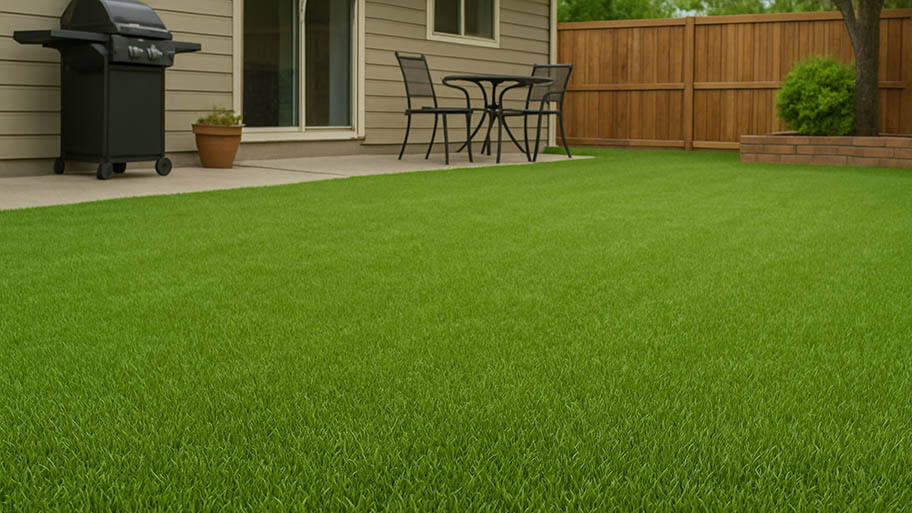
Your total lawn care cost depends on several factors, including the type of service and lawn size. Our guide will cover what you can expect to pay for lawn care.
Cut your grass the old-fashioned way
A reel lawn mower is better for the health of your lawn
This type of mower requires minimal maintenance
A reel mower can be worth the cost if you have a small yard
If you have a small yard to mow and would prefer not to use a bulky, gas-guzzling mower to get the job done, a reel lawn mower might be the better option. These old-fashioned push mowers are quiet and easy to operate, and they produce zero emissions.
They also provide a clean, precise cut, which is better for the overall health of your lawn and grass. Read on to find out more about the benefits of a reel mower.
A reel lawn mower essentially snips your grass like a pair of scissors would. It doesn’t have a built-in power source; by pushing it, you cause the blades to spin. (Most push reel mowers are manual, although you can also find gas- or battery-powered ones.) Compact, quiet, and easy to maneuver, this type of mower is best for those with small lawns.
Most reel mowers have a long handle and two wheels on a single axle, with either four, five, or seven blades (keep in mind that more blades lead to a cleaner cut). They use these blades to pull grass into the mower so that the cutter bar can snip it. The blades spin vertically, rather than horizontally, using a scissoring action that cleanly slices grass.
There are a few key pros and cons to consider when trying to decide if a reel mower is right for you. The biggest advantage of a reel mower is that it provides a cleaner cut, but if you have a massive yard, it might not make sense to use a push mower.
Carefully weigh the following pros and cons before making your decision:
There’s no denying the benefits of a reel mower. Most notably, reel mowers are better for your lawn’s health. They provide a clean, scissor-like cut, which helps your grass heal faster (and also makes for a tidier look).
In comparison, power rotary mowers rip and shred your grass, which can leave your lawn vulnerable to insect attacks and disease.
Reel mowers are also quiet in operation, resulting in a more peaceful user experience. They produce zero emissions, so they don’t degrade air quality like gas-powered mowers do. And, they’re easy to operate, easy to maintain, and affordable.
However, if your grass is too tall and/or dense before mowing, it’ll likely be impossible to cut it with a manual reel mower. In this case, a reel mower will just push the grass down and ineffectively roll over it.
You’ll also need to clean up any debris (twigs, leaves, etc.) from your yard before mowing since reel mowers can’t go over anything that’s not grass. In addition, since most reel mowers are manual, they do require some physical effort to operate, which might not be everyone’s cup of tea.
It’s important to know what goes into caring for and maintaining your mower, whether you’re focused on regular upkeep or trying to decide whether you should repair or replace your mower altogether.
Luckily, reel mowers require very little maintenance, especially when compared to gas mowers, which require regular upkeep in the form of oil changes, tune-ups, and more.
To ensure your push reel mower stays in tip-top shape, you should lubricate and sharpen the blades every two to three years. And of course, don’t forget to clean off your mower each time you use it. Just hose off all the grass clippings and let it dry.
Reel mowers generally range in price from $80 to $200, which is more affordable than other types of mowers. You also don’t have to pay for oil or gas like you do with gas-powered mowers.
Considering the many benefits of a reel lawn mower, if you have a small lawn and don’t mind the physical act of pushing your mower around the yard, a reel mower is very much worth the price.
That said, if you have a super-spacious lawn, it may not be worth it to purchase a reel mower since this type of mower is designed for small, flat lawns. Also, you have to put more time and effort into cutting your grass than you would with a gas-powered mower.
If you don’t have a ton of extra time to devote to your lawn, a reel mower might not be worth the price—in which case, you may want to hire a local landscaping company to take care of your lawn, so you don’t have to worry about it.
From average costs to expert advice, get all the answers you need to get your job done.

Your total lawn care cost depends on several factors, including the type of service and lawn size. Our guide will cover what you can expect to pay for lawn care.

Removing an old lawn is often necessary to plant new grass or build a new outdoor structure. Find out what to budget for your lawn removal cost.

Artificial grass is a low-maintenance alternative to traditional turf. Learn how much artificial grass installation costs and what affects your price.

Learn when the best time to mow new grass, plus some considerations to consider in this short informational guide for homeowners.

Crabgrass is one tough weed, but with a little patience, you can banish it from your lawn. Follow these steps for how to get rid of crabgrass for good.

Making grass greener and thicker is easy—when you know how it’s done! Find out how to make your grass green and lush with these simple tips. This guide has everything to know about making grass greener to get a beautiful, healthy lawn.